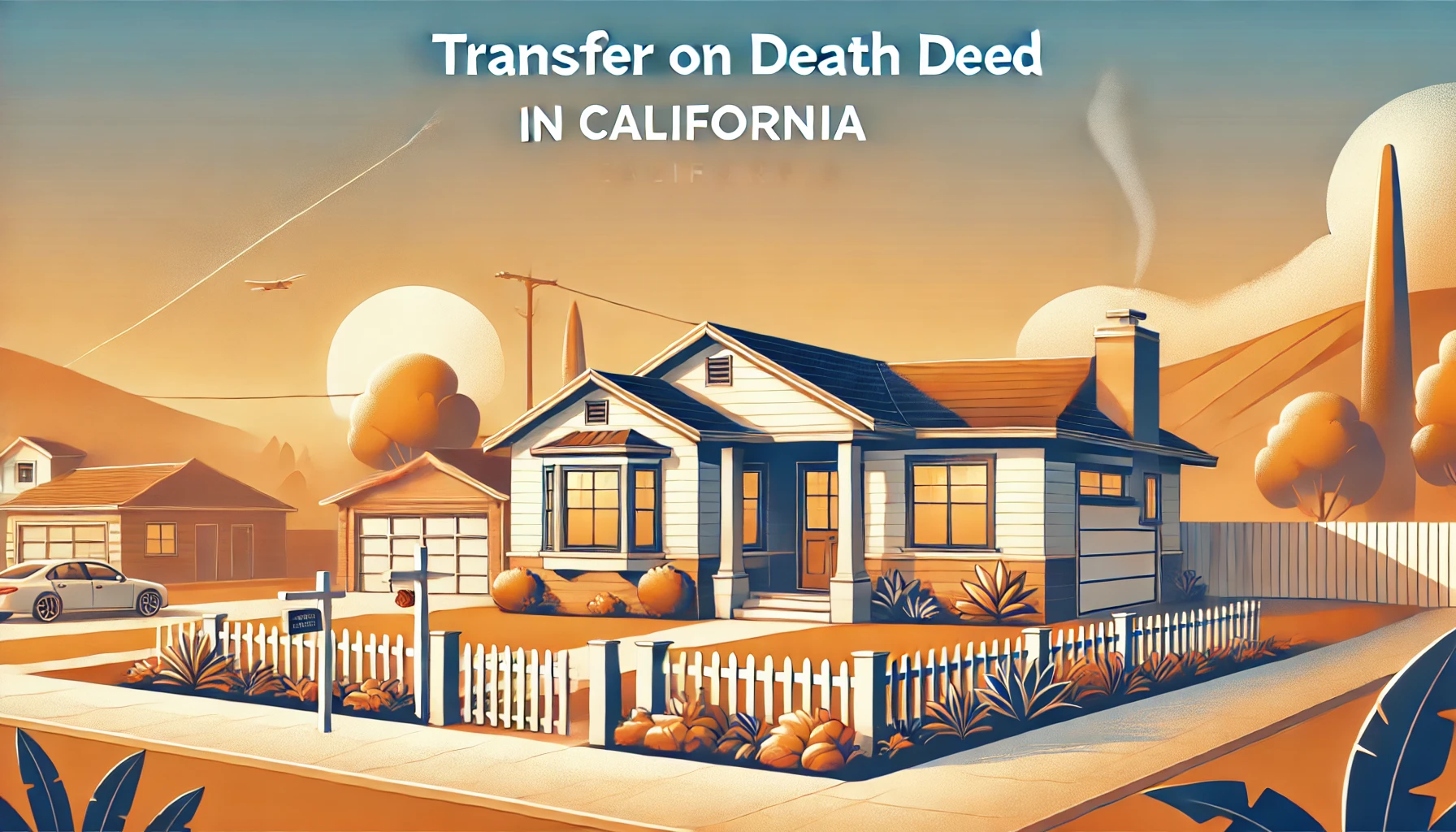
New Rules for California Homeowners
Since 2016, California has been offering homeowners a very simple way to transfer their homes to beneficiaries. It’s called the transfer on death deed — also written as TOD deed, TODD, or beneficiary deed. A TOD deed, where a state allows it, enables a named beneficiary to take title without the need for probate or trust administration.
Fast-forward to September 2021. California’s governor has signed Senate Bill 315 into law. This has changed the way a homeowner can create or revoke a transfer on death deed, starting in 2022.
Note: If a California TOD is executed before Jan. 1, 2022, it will be valid.
Now, what’s the difference between the current TOD law and the one that takes effect in 2022? Let’s check it.
Nuts and Bolts: Requirements of a TOD Deed in California

First, to use a TOD deed in California, you must be passing along a residence. This is defined to include a single-unit home, a multi-unit residence of up to four housing units, a condo, or a home on agricultural property of up to 40 acres.
The TOD deed will work on its own after you pass on. It won’t need a trust or a probate court to operate. But be sure to check your current deed to see how your title is vested. Of course, a TOD deed will never trump a joint owner’s rights of survivorship.
☛ For more information on vesting your title as sole versus jointly owned, see How’s Your Property Vested? It Matters as Much as Your Will or Trust.
A California TOD deed must be signed before a notary, dated, and recorded in the county within 60 days. It must precisely name the beneficiary or beneficiaries to whom you’d like to pass your ownership. (If it names multiple beneficiaries, they must get the asset in equal shares.) The TOD deed has to recite the legal property description. Be sure the property description and your name on the TOD deed exactly match what’s written on the current deed (the one recorded when you took title to the house).
You can change your mind or fix an error on the TOD deed, by revoking the deed and creating a new one. A TOD deed is revocable because the beneficiary has no rights in the property until the homeowner dies. As the homeowner, you pay the home loan, taxes, and all costs of maintaining the home as long as you’re living. When you pass on, your named beneficiary takes over these responsibilities. Your beneficiary will have to pay off any debts still attached to the home.
What’s New and Why
Owners are drawn to this legal innovation for its simplicity: it conveys a home after death without involving probate or the expense and complexity of a revocable living trust. TOD deeds are easily made: the homeowner just completes a form, signs it with a notary, and records it, as explained above.
Here’s the rub. While offering simplicity, the TOD might make it too easy to pass a house to a manipulative person. Title insurers are leery of TOD deeds for this very reason. The instruments have only been legal in California for a few years, and insurers often expect to see that the new owner has owned the home without any issues for three years after the late homeowner passed. So, your beneficiary could run into hitches selling or taking a loan out. California acted to make the TOD more trustworthy.
Specifically, S.B. 315 has redefined some terminology, and inserted safeguards into the law to support older or vulnerable homeowners, as well as to prevent burdens from being unfairly passed on to beneficiaries. Here are a few of the key provisions to watch for:
- From 2022 on, notarizing the TOD deed will require two witnesses to be present. They must sign as well. The beneficiary of the TOD deed should not be a witness.
- Revoking the TOD deed will involve signing a new document with a notary.
- When the homeowner passes, the beneficiary will need to notify the homeowner’s heirs.
- The creator of the TOD deed must use the new notice form, from 2022 onward.
As you can see, S.B. 315 tightens the rules of the TOD. Yet it also adds a measure of flexibility for language, so that the property can go where it was meant to go, despite some procedural mistakes that might be made by the homeowner. It will guide courts on correcting certain errors instead of deeming a TOD deed void, if the homeowner’s intent is evident. An imperfect TOD deed intended to donate property can be corrected — though a charity or public entity has to agree to receive the title.
Look also for the new provisions pertaining to liability of a beneficiary, return of property from the beneficiary to the late homeowner’s estate, and procedures for challenging a TOD or its revocation.
Is It Better to Use a TOD Deed Than a Trust?
It could be. The TOD will still be relatively simple and inexpensive, and it leaves the homeowner in control of the real estate throughout life. But speak with a lawyer in the state, so you understand the property tax reassessment consequences. You might find out that a better plan is to work with an estate planning lawyer to place your home in a trust specific to your needs and circumstances.
Consider what will happen if you become incapacitated. Should that happen, your beneficiary won’t be able to assist in decisions about your property, or help you tap into your equity for medical care — because the beneficiary’s role is nonexistent while you are still alive. In contrast, a revocable living trust could empower a trustee to act for you.
Pro tip: Have you received Medi-Cal benefits? If so, and if your beneficiary dies with you or dies before you, your property will be subject to probate and hence to Medi-Cal recovery.
Are There Special Concerns for Minors as Beneficiaries?
Yes, and it is important to speak with an estate planning attorney to understand the ramifications if you name an underage beneficiary. The attorney can also advise you on the best actions to take to protect your estate or your beneficiaries from debt and liability risks. Here, we’ll go over just two broad-stroke concerns.
First, if your TOD beneficiary is still a minor when you pass away, a court will appoint a representative for your child. Remember, a revocable living trust enables you to decide on who should represent your beneficiary and manage your finances if circumstances require this.
Second, note that a 2020 ballot measure, California’s Proposition 19, interacts with your estate planning. A child who receives your home has to keep it as a primary residence and the property has to be valued under $1 million to be exempt from property tax reassessment.
☛ Proposition 19 became effective in 2021 and will result in tax increases for heirs as they face property tax reassessments. Learn more about California Prop 19 here.
Plan Wisely
If you are a California homeowner who’s considering a transfer on death deed, know that S.B. 315 will change the rules, starting in 2022. It will complicate TOD deeds a little more — the cost of making them less vulnerable to fraud and manipulation.
Of course, no law can make TODs fraud-proof, as forgeries can still occur. Sometimes, extra steps in the law can create more ways of potentially making mistakes, too. It’s important, when creating a deed of any type, to check your work for errors (even typos), and adhere to the format required by law. At Deeds.com, we offer state-specific Transfer on Death Deed Forms for downloading.
☛ Important note: Deeds have legal effects. As always, speak with an estate planning attorney to understand case-specific consequences of legal decisions about passing your assets on after your life — particularly your home.
Supporting References
California Probate Code: Sections 5610 to 5672; and California Senate Bill 315.
Office of Governor Gavin Newsom: Governor Newsom Signs Nation-Leading Legislation Expanding Protections for Warehouse Workers (Sep. 22, 2021).
California Land Title Association: Transfer on Death Deeds Legislation Introduced (Feb. 16, 2021).
Lauren Murvihill for JDSupra.com: Will California SB 315 Improve Revocable Transfer on Death Deeds? (Jul. 16, 2021).
California Proposition 19: Property Tax Transfers, Exemptions, and Revenue for Wildfire Agencies and Counties Amendment (2020).
Photo credit: Elina Fairytale, via Pexels.
